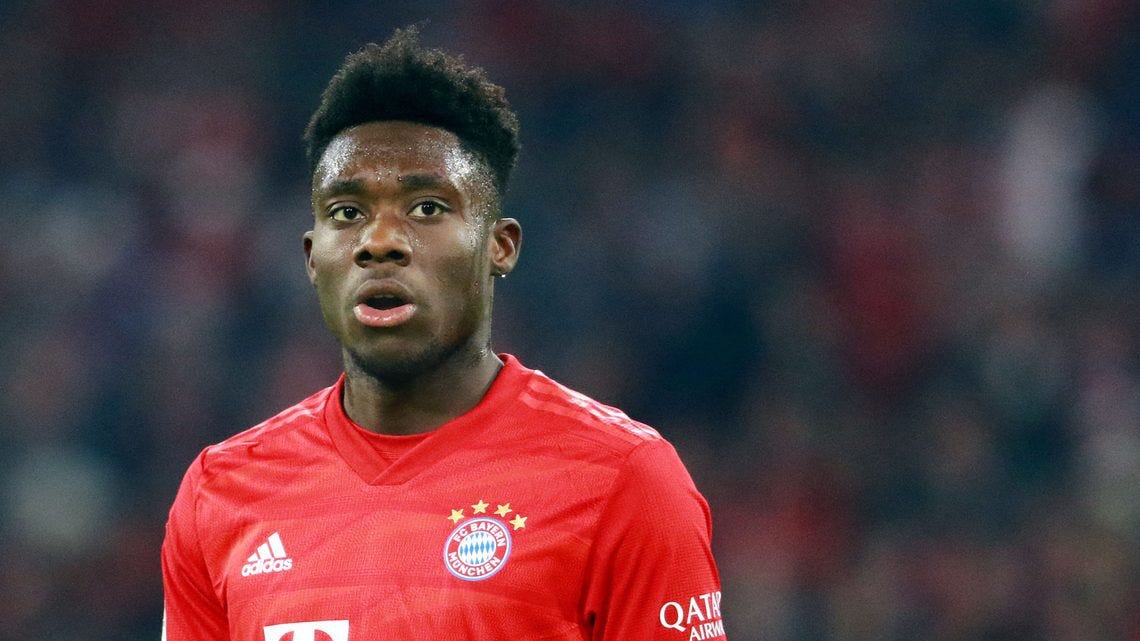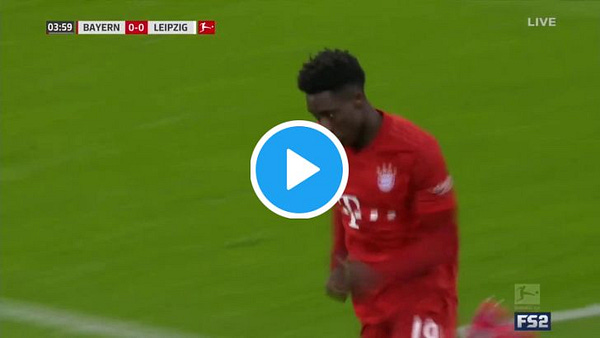Yep, Alphonso Davies Is Already That Good
How did he go from MLS winger to world-class fullback all before his 20th birthday?

Alphonso Davies is fast. How fast? Here’s what one of his old performance coaches told my buddy Noah Davis: “[He] could get up to 10.5 meters per second in game play. That's 23.5 miles per hour. I still haven't seen that in any other athletes. He could get to that speed at any point in the game.” As Noah wrote: “That speed of 23.5 mph puts Davies in the elitist of elite company, ahead of Paris Saint-Germain speedster Kylian Mbappe (22.4 mph), Manchester City's Kyle Walker (21.9 mph) and Liverpool's Mohamed Salah (21.8 mph).”
Davies is faster than, well, just about everyone. He’s so easily and effortlessly the fastest player on the field that it almost seems artificial. He destroys context. RB Leipzig’s Dani Olmo is 22 years old. This video will convince you that he’s already had multiple hip-replacement surgeries and should have retired from football five years ago:
Of course, speed is just speed; unless you’re running around a track, it’s not much use without a bunch of other skills. Take a look at this list of the fastest 30-meter times from the MLS Combine. Congratulations if you recognize more than one name.
Davies is 19 years old. Two years ago, he was a winger for a mediocre MLS team, playing against a handful of those Combine standouts. In October, he was playing in the German third-division. Today, he’s one of the best fullbacks in the world for quite possibly the best soccer team in the world. There’s no other way to put it: That was fast.
Davies’s signature moment for Bayern so far is probably his performance against Chelsea in the Champions League, particularly his assist on the third goal, where he leaves a vapor trail down the left sideline:
But I think his assist from Saturday (at the 1:32 mark) sums up his fantastic half-season better than anything else:
Bayern Munich have more possession than any team in Europe: 67 percent of the time. A young, inexperienced speedster like Davies would, theoretically, be a better fit for a team that’s trying to counter-attack, sitting back and then breaking into space. He would, this theory goes, benefit from having space to run into. However, Davies has found a way to make his speed work within Bayern’s aggressive, field shrinking system. On his assist to Muller, there’s a loose ball, but the Frankfurt defense is relatively set. Seeing Davies ahead of him, the Frankfurt defender doesn’t just bail on trying to win possession; no, he suddenly drops back five yards to also give himself a head start on Davies’s impending run. But instead of pushing forward, Davies just stops in the newfound space, with the newfound ball, takes a look into the box, and picks out Muller with a perfectly shaped pass. Since becoming Bayern’s full-time fullback back in the fall, he’s used his speed to make everything else easier. But he still has to do everything else, too.
Among all fullbacks and wingbacks in Europe’s Big Five leagues, Davies is first in ball recoveries per 90 minutes and dribbles per 90 minutes, per Stats Perform. There’s no one more active in terms of regaining possession and then pushing the ball up the field. This is a heat map for all of his attempted dribbles in the Bundesliga this season, again per Stats Perform:

And here’s a heat map of where he typically recovers the ball:

Beyond the sheer volume, the locations are concentrated in some of the most valuable areas of the field. He’s picking up loose ball after loose ball right on the edge of Bayern’s defensive third, which prevents opponents getting into the attacking phase of possession and bringing the penalty area into play. The dribbles, meanwhile, mainly come in the areas where the defensive third becomes the middle third, the middle third becomes the attacking third, and then right where the last line of defense is typically sitting.
Dribbling is often divorced from effectiveness, but not with Davies. His attacking rating from the site Smarterscout -- how much a player increases his team’s chances of scoring, adjusted for position, league, and possession -- is a robust 75 out of 100. He’s 13th among fullbacks in expected assists per 90 minutes (0.17) and 15th in passes completed into the final third. He starts more possessions that lead to shots and goals than any other player at his position -- see: all those recoveries -- and only one other fullback sees a higher percentage of the sequences (an interrupted possession) he’s involved in lead to goals (Borussia Mochengladbach’s Ramy Bensebaini). Davies completes a higher percentage of his passes than Bayern’s starting holding midfielder Joshua Kimmich, and among the team’s regulars, only Kimmich, Thiago, David Alaba, and Benjamin Pavard complete more progressive passes per 90 minutes. (Progressive passes are defined by FBRef as “Completed passes that move the ball towards the opponent's goal at least 10 yards from its furthest point in the last six passes, or completed passes into the penalty area. Excludes passes from the defending 40% of the pitch.”) Simply put, when Davies touches the ball, wherever he’s touching it and however he’s touching it, good things tend to happen.
On top of all that attacking involvement, Davies leads all Bayern players in tackles per 90 minutes. He’s second to Thomas Muller in successful pressures (per FBRef: “Number of times the squad gained possession within five seconds of applying pressure”) and first in his percentage of successful pressures. According to Smaterscout, he rates as a 95 out of 100 when defending one on ones. Try to dribble by him, and it’s not gonna work out for you. He can get caught out of position and Bayern are sometimes vulnerable down their left side. But Davies is incredibly active on the defensive end, and a team like Bayern, a team that has the ball for two-thirds of nearly every match they play, can fade that aspect of his game.
Over the summer, Bayern Munich bought Lucas Hernandez from Atletico Madrid for €80 million -- or around 12 percent of their annual revenue. The former made him the third-most expensive defender of all time and the most expensive (sometimes) fullback. They also already had David Alaba, arguably the best left back in the world and a player Pep Guardiola referred to by saying, “David Alaba is our God.” And yet, through a combination of injuries, opportunity and blinding performance, Davies, who joined Bayern last january from the Vancouver Whitecaps for an MLS-record-but-still-a-pittanance-by-comparison $22 million fee, has emerged the first-choice fullback and one of the first names on the team sheet. Since Hansi Flick became manager back in November, only Manuel Neuer and God have played more minutes than Davies.
In addition to all of the obvious benefits he can directly provide, there are plenty of knock-on effects from having a phenom like Davies in the team. It lets Bayern play a more conservative fullback, Benjamin Pavard, on the other side, which helps strengthen the defense while still allowing the team to produce on the attacking end at an elite level. His incredible recovery speed makes Bayern’s high line -- they win the ball back higher up the field than any team in Europe outside of Manchester City -- less vulnerable than it typically might be without sacrificing more numbers higher up the field. And his ever-present threat from deep opens up all kinds of space for the other players -- the winger, the center mid -- on that side of the field.
It’ll be fascinating to see how Borussia Dortmund deal with this today, as they’ve got their own precocious superstar wide player in Achraf Hakimi, who plays on the right and will be pitted directly against Davies. He leads Dortmund in progressive passes, he’s advanced the ball farther upfield with his feet than any other player in the league, and he’s already registered 10 assists this season. However, Hakimi has done most of that with three center backs behind him; he’s a wingback, while Davies is producing like one despite functioning in a traditional back four. Will the threat of Davies be able to pin back Hakimi’s runs forward? We already know the answer to the reverse of that question; the whole point of Alphonso Davies at fullback is that you can’t pin him back.
Now, it’s only been about half a season, but Davies has entered a special class of young players. Throw him in with Kylian Mbappe, Trent Alexander-Arnold, Erling Haaland, and Jadon Sancho; these are players whose projections no longer fit on any previously established curves. They’ve all been so good at such an early age that even modest peek into their fully-developed futures feel like they’re barely connected with reality.
Despite how enthralling he is to watch, the most impressive aspect of Davies’s performance thus far might also be the most boring part. In games that Davies has appeared in, Bayern are averaging 2.35 points per game -- a higher rate than any other player in the league. Put Alphonso Davies on the field, and your team is more likely to win than they were without him. He’s 19, and that’s already true for just about every club in the world.




